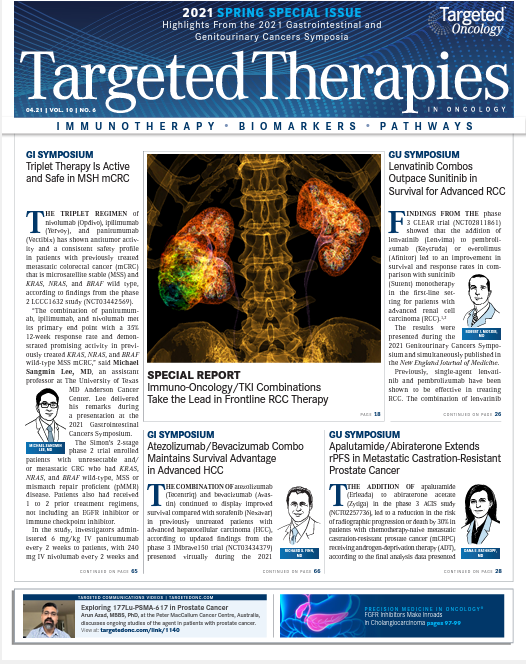Adjuvant Nivolumab Confers 30% Reduction in Disease Recurrence in MIUC
Findings from a A phase 3 trial evaluating adjuvant nivolumab following surgery versus placebo demonstrated an improvement in median disease-free survival in patients with muscle-invasive urothelial cancer, according to results from the CheckMate 274 trial presented at the 2021 Genitourinary Cancers Symposium.

Findings from a A phase 3 trial (NCT02632409) evaluating adjuvant nivolumab (Opdivo) following surgery versus placebo demonstrated an improvement in median disease-free survival (DFS) in patients with muscle-invasive urothelial cancer (MIUC), according to results from the CheckMate 274 trial presented at the 2021 Genitourinary Cancers Symposium.
Investigators found that nivolumab conferred a median DFS benefit in both the intention-to-treat (ITT) and PD-L1–positive populations. In the ITT population, DFS in those treated with nivolumab (n = 353) was 21.0 months, compared with 10.9 months with placebo (n = 356; HR, 0.70; 98.31% CI, 0.54-0.89; P < .001).
“This corresponds to a 30% reduction in the risk of disease recurrence or death with nivolumab,” said lead author Dean Bajorin, MD, the Frederick R. Adler senior faculty chair at Memorial Sloan Kettering Cancer Center in New York. “The median DFS is nearly double with nivolumab compared to placebo.”
In the PD-L1–positive population, the median DFS in those treated with nivolumab (n = 140) was not reached, compared with 10.8 months in the placebo arm (n = 142; HR, 0.53; 98.87% CI, 0.34-0.84; P < .001). “This corresponds to a 47% reduction in the risk of disease recurrence or death with nivolumab,” Bajorin said.
A subgroup analysis of the ITT population found no differences related to age, sex, region, or performance status, he added.
The monoclonal antibody also improved median non–urothelial tract recurrence-free survival (NUTRFS), a secondary end point of the study, as well as distant metastasis free survival (DMFS), an exploratory end point, in both the ITT and the PD-L1–positive patient populations
In the ITT population, those treated with nivolumab experienced NUTRFS of 24.6 months versus 13.7 months in the placebo group (HR, 0.72; 95% CI, 0.58-0.89). In the PD-L1– positive population, NUTRFS in those treated with nivolumab was not reached versus 10.9 months in the placebo group (HR, 0.54; 95% CI, 0.38-0.77).
“Nivolumab is the first systemic immunotherapy to demonstrate a statistically significant and clinically meaningful improvement in outcomes when administered as adjuvant therapy to patients with muscle-invasive urothelial carcinoma,” Bajorin said. “These results support nivolumab monotherapy as a new standard of care in the adjuvant setting for patients with high-risk MIUC after radical surgery regardless of PD-L1 status and prior neoadjuvant chemotherapy.”
The randomized, double-blind CheckMate 274 study evaluated the efficacy and safety of adjuvant nivolumab versus placebo in patients with high-risk MIUC after radical surgery. Patients were randomized 1:1 to receive nivolumab 240 mg administered once every 2 weeks or placebo for up to 1 year of adjuvant treatment.
Eligible patients had radical surgery within 120 days with or without neoadjuvant cisplatin or were ineligible/declined cisplatin-based chemotherapy and were disease-free as evidenced by imaging.
The primary end point of the study, according to investigators, was DFS in the ITT population and in patients with tumor PD-L1 expression of at least 1%. The median follow-up was 20.9 months for nivolumab and 19.5 months for placebo.
In total, 353 patients were randomized to receive nivolumab and 356 patients received placebo. In the nivolumab arm, 53.3% of patients discontinued treatment and in the placebo arm, 56.3% of patients discontinued. This was most commonly due to disease recurrence.
Among patients in the nivolumab arm, the tumor of origin was urinary bladder carcinoma in 79% of patients and upper tract disease in 21% of patients. In the placebo arm, the tumor of origin was the bladder in 78.9% of patients and upper tract disease in 21.1% of patients. About 40% patients in both arms were PD-L1 positive and about 43% had received prior cisplatin based neoadjuvant chemotherapy.
The safety of nivolumab was consistent with previously reported studies in patients with solid tumors. Grade 3 or higher treatment-related adverse events (TRAEs) occurred in 17.9% of patients in the nivolumab arm and 7.2% of patients in the placebo arm.
Any-grade TRAEs leading to discontinuation occurred in 12.8% in the nivolumab arm and 2% of patients in the placebo arm. The most common TRAEs in the nivolumab arm were pruritis, fatigue, diarrhea, and rash.
Nivolumab is approved by the FDA as a monotherapy for the treatment of platinum-resistant urothelial carcinoma.
References:
Bajorin DF, Witjes JA, Gschwend J, Schenker M. First results from the phase 3 CheckMate 274 trial of adjuvant nivolumab vs placebo in patients who underwent radical surgery for high-risk muscle-invasive urothelial carcinoma (MIUC). J Clin Oncol. 2021;39(suppl 6):391. doi:10.1200/

Survivorship Care Promotes Evidence-Based Approaches for Quality of Life and Beyond
March 21st 2025Frank J. Penedo, PhD, explains the challenges of survivorship care for patients with cancer and how he implements programs to support patients’ emotional, physical, and practical needs.
Read More